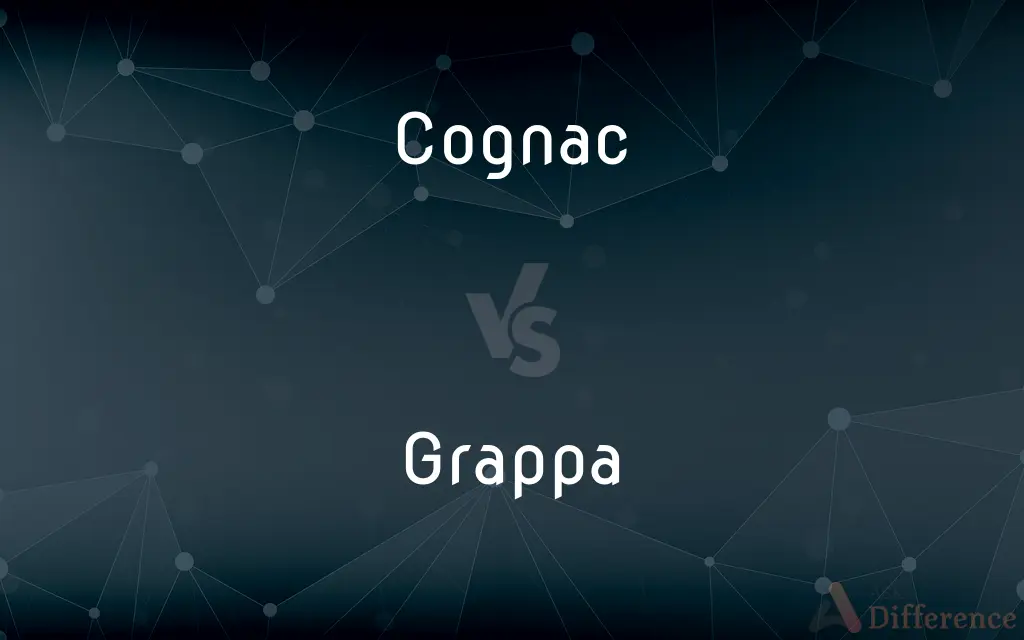Cognac vs. Grappa — What's the Difference?
By Fiza Rafique & Urooj Arif — Updated on March 8, 2024
Cognac is a type of brandy from the Cognac region of France, known for its smooth, aged flavor, while Grappa is an Italian spirit made from grape pomace, with a robust, distinct taste.

Difference Between Cognac and Grappa
Table of Contents
ADVERTISEMENT
Key Differences
Cognac, a prestigious form of brandy, is produced through the double distillation of white wine in the Cognac region of France and is aged in oak barrels. This process imparts a rich, complex flavor profile that includes notes of fruit, spice, and vanilla. Grappa, on the other hand, originates from Italy and is made by distilling the pomace (the skins, seeds, and stems left over from winemaking), which gives it a more potent and earthy flavor compared to cognac.
A significant difference between the two spirits is their base ingredients and production methods. Cognac is made exclusively from certain grape varieties and must meet strict production regulations to carry the name. Grappa's base, the pomace, is a byproduct of winemaking, making it a unique way to utilize waste. This results in differing taste profiles: Cognac is often described as smoother and more refined, whereas Grappa is more rustic and robust.
Another aspect that sets them apart is their aging process. Cognac's aging in oak barrels not only contributes to its smoothness but also to its complexity and depth of flavor. Grappa can also be aged in wood, but not all are, and those that are tend to have a less uniform aging process, leading to a wider variety of flavors and characteristics.
The geographical designation is crucial for both spirits but applies differently. Cognac must be produced in the Cognac region and adhere to strict guidelines regarding grape varieties, distillation, and aging. Grappa, while Italian, can be made anywhere in Italy and even in parts of Switzerland, provided it follows the basic criteria for grappa production.
Despite these differences, both Cognac and Grappa share the trait of being deeply rooted in their local traditions and history. They reflect the heritage and terroir of their respective regions, offering a sense of place through their unique flavors and production methods.
ADVERTISEMENT
Comparison Chart
Origin
Cognac region, France.
Italy.
Base Ingredient
White wine from specific grape varieties.
Grape pomace (skins, seeds, stems of grapes).
Distillation
Double distilled.
Distilled from pomace.
Flavor Profile
Rich, complex, smooth, with fruit and vanilla notes.
Robust, earthy, potent.
Aging
Aged in oak barrels, contributing to smoothness and flavor complexity.
May be aged in wood, but not always, leading to a variety of flavors.
Geographical Designation
Must be made in the Cognac region following strict guidelines.
Can be made throughout Italy and parts of Switzerland, with fewer restrictions.
Compare with Definitions
Cognac
A premium French brandy with a smooth taste.
The Cognac was aged for decades, developing a rich flavor.
Grappa
Italian spirit with a bold flavor.
The Grappa was distilled from the finest grape pomace.
Cognac
Known for its depth and complexity.
Connoisseurs appreciate Cognac for its nuanced bouquet of aromas.
Grappa
Made from winemaking byproducts.
Grappa creatively utilizes the pomace left over from winemaking.
Cognac
Requires double distillation.
The double distillation process is essential to creating Cognac's distinctive smoothness.
Grappa
Known for its potent character.
Grappa is often enjoyed after dinner as a digestif, thanks to its strong flavor.
Cognac
Enjoyed worldwide as a sign of sophistication.
Cognac is often sipped neat to savor its complex flavors.
Grappa
Can be both unaged and aged.
Whether aged in barrels or not, Grappa maintains a distinctive robust taste.
Cognac
Must be made in Cognac, France.
True Cognac can only come from its namesake region.
Grappa
Less regulated than Cognac.
Grappa's production varies widely across Italy, reflecting local traditions.
Cognac
Cognac ( KON-yak, also US: KOHN-, KAWN-, French: [kɔɲak] (listen)) is a variety of brandy named after the commune of Cognac, France. It is produced in the surrounding wine-growing region in the departments of Charente and Charente-Maritime.
Grappa
A brandy distilled from the fermented residue of grapes after they have been pressed in winemaking.
Cognac
A high-quality brandy, strictly speaking that distilled in Cognac in western France
We went to a bar and had some cognac
A good range of cognacs
Grappa
Grappa is an alcoholic beverage: a fragrant, grape-based pomace brandy of Italian origin that contains 35 to 60 percent alcohol by volume (70 to 120 US proof). Grappa is traditionally produced in Northern Italy and is also widely consumed in places such as Argentina, Bulgaria, Georgia (Chacha (brandy)), Uruguay and Galicia (better known as Spanish orujo or aguardiente).
Cognac
A brandy distilled from white wine and produced in the vicinity of Cognac.
Grappa
An Italian brandy distilled from the pomace of grapes used in winemaking.
Cognac
A brandy distilled from white wine in the region around Cognac in France.
Major manufacturers add a small proportion of caramel to color their cognacs.
Grappa
(uncountable) An Italian grape-based spirit of between 80 and 100 proof, made from the distillation of pomace.
Cognac
A kind of French brandy, so called from the town of Cognac.
Grappa
(countable) A variety or serving of grappa.
Cognac
High quality grape brandy distilled in the Cognac district of France
Grappa
Italian brandy made from residue of grapes after pressing
Common Curiosities
What are the best ways to enjoy Cognac and Grappa?
Cognac is often enjoyed neat, sometimes with a drop of water or on ice to reveal its flavors. Grappa can be enjoyed neat as a digestif, or in espresso in a "caffè corretto" style.
Can Grappa be aged like Cognac?
Yes, Grappa can be aged in wood barrels, though it is not a requirement. Aged Grappa develops additional complexity and smoothness, somewhat akin to Cognac, but retains a distinct character.
Why is Cognac considered a luxury spirit?
Cognac's reputation as a luxury spirit stems from its meticulous production process, aging requirements, and the prestige associated with its French origin.
What makes Cognac different from other brandies?
Cognac is distinct due to its specific geographic origin, strict production standards, and double distillation process, which contribute to its unique flavor and quality.
Is Grappa stronger than Cognac?
While the alcohol content might be similar, Grappa is often perceived as stronger due to its potent and earthy flavor profile compared to Cognac's smoother taste.
Are there any cocktails made with Cognac or Grappa?
Yes, both spirits are used in cocktails. Cognac is popular in classic cocktails like the Sidecar, while Grappa can be used in innovative mixed drinks or served chilled.
How do the grape varieties used in Cognac production compare to those for Grappa?
Cognac is made from specific white grape varieties like Ugni Blanc, which are known for their acidity and suitability for distillation. Grappa can be made from a wide range of grape pomace, reflecting the diversity of Italian winemaking.
Can both Cognac and Grappa be used in cooking?
Yes, both can be used in cooking to add flavor to sauces, desserts, and other dishes, though their distinct flavors should be considered to complement the dish.
How long can Cognac and Grappa be stored?
Both spirits can be stored for many years if kept in properly sealed bottles and stable conditions, though Cognac can continue to mature in the bottle, unlike Grappa.
Do Cognac and Grappa have health benefits?
In moderation, both may aid digestion due to their alcohol content. However, excessive consumption can lead to health risks, and any potential benefits do not outweigh these risks.
Share Your Discovery

Previous Comparison
Elf vs. Gnome
Next Comparison
Innocence vs. GuiltAuthor Spotlight
Written by
Fiza RafiqueFiza Rafique is a skilled content writer at AskDifference.com, where she meticulously refines and enhances written pieces. Drawing from her vast editorial expertise, Fiza ensures clarity, accuracy, and precision in every article. Passionate about language, she continually seeks to elevate the quality of content for readers worldwide.
Co-written by
Urooj ArifUrooj is a skilled content writer at Ask Difference, known for her exceptional ability to simplify complex topics into engaging and informative content. With a passion for research and a flair for clear, concise writing, she consistently delivers articles that resonate with our diverse audience.














































